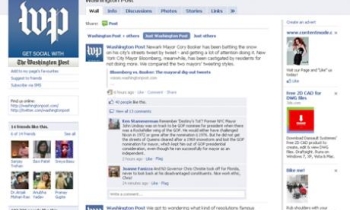Advertising is likely to start appearing on the BBC.com website from next month.
BBC Worldwide is moving quickly to generate revenues from its global audience following approval for the controversial plan from the BBC Trust.
From later today, an "advertise with us" link is set to appear for the first time on BBC.com news pages.
BBC.com has an estimated 26.5m international visitors a month, according to research firm ComScore.
"This will give information about advertising, how to go about it, and we are updating our feedback terms and conditions pages," said the BBC head of news interactive, Pete Clifton, in an email to news staff today.
The next step will be to start delivering the first of the ads, something Mr Clifton indicated was "probably" going to happen from next month.
"In the first phase, advertising will be introduced, probably next month, on selected high-traffic pages visible only to those logging in from outside the UK," he said.
However, location-based blocking technology, run for the BBC by Quova, is not perfect and some UK web surfers will inevitably see some of the ads.
A far-from-definitive analysis has estimated that 3,000 UK users could see ads meant for an international audience.
Mr Clifton acknowledged the cautious approach that needs to be taken despite the desire to get the advertising system up and running as soon as possible on BBC.com.
"It is likely to be some weeks before any ads appear on the internationally viewed site," he said. "We will need to be completely sure that the day-to-day editorial and technical processes are in place before that happens."
The BBC Trust approved the proposal for ads to run initially on the international homepage and selected news, sport, weather, science and nature web pages to carry advertising.
Editorial control of news pages will continue to be the responsibility of BBC news, while bbc.com will pay for the content it uses.
In February, the BBC Trust requested additional information about the BBC.com ad plans including the strategic benefit and editorial safeguards.
These safeguards include being able to monitor advertising in real time so that changes can be made quickly if necessary as a result of a specific story.
In the event of a major international incident, "the BBC would have the power to withdraw all advertising for an appropriate period of time".
The BBC Trust conceded that advertising, if not properly governed, could dent the corporation's brand and reputation.
However, it noted that international TV news channel BBC World is commercially funded but still trusted, and that international news providers of repute such as the FT, Economist, CNN and New York Times all carry ads.
In its final decision the BBC Trust gave the green light to advertising on BBC.com with several conditions. One of these is that editorial performance must be closely monitored and reported on to the corporation's journalism board, which must notify the trust of "any significant failure" in editorial control.
Any future development of BBC.com will also be subject to BBC Trust approval.
"We will not be offering highly intrusive advertising and are taking significant steps to manage any potential conflict of interest between advertisers and editorial content to ensure our journalism is not compromised in any way," said Richard Sambrook, the BBC director of global news in a post on the BBC news editors' blog today .
"We recognise that some users will be unhappy with this change. However, in tests and surveys in advance of this change, the majority of international users did not express a strong objection and a majority of those surveyed in the UK agreed with the principle of advertising for international users."









